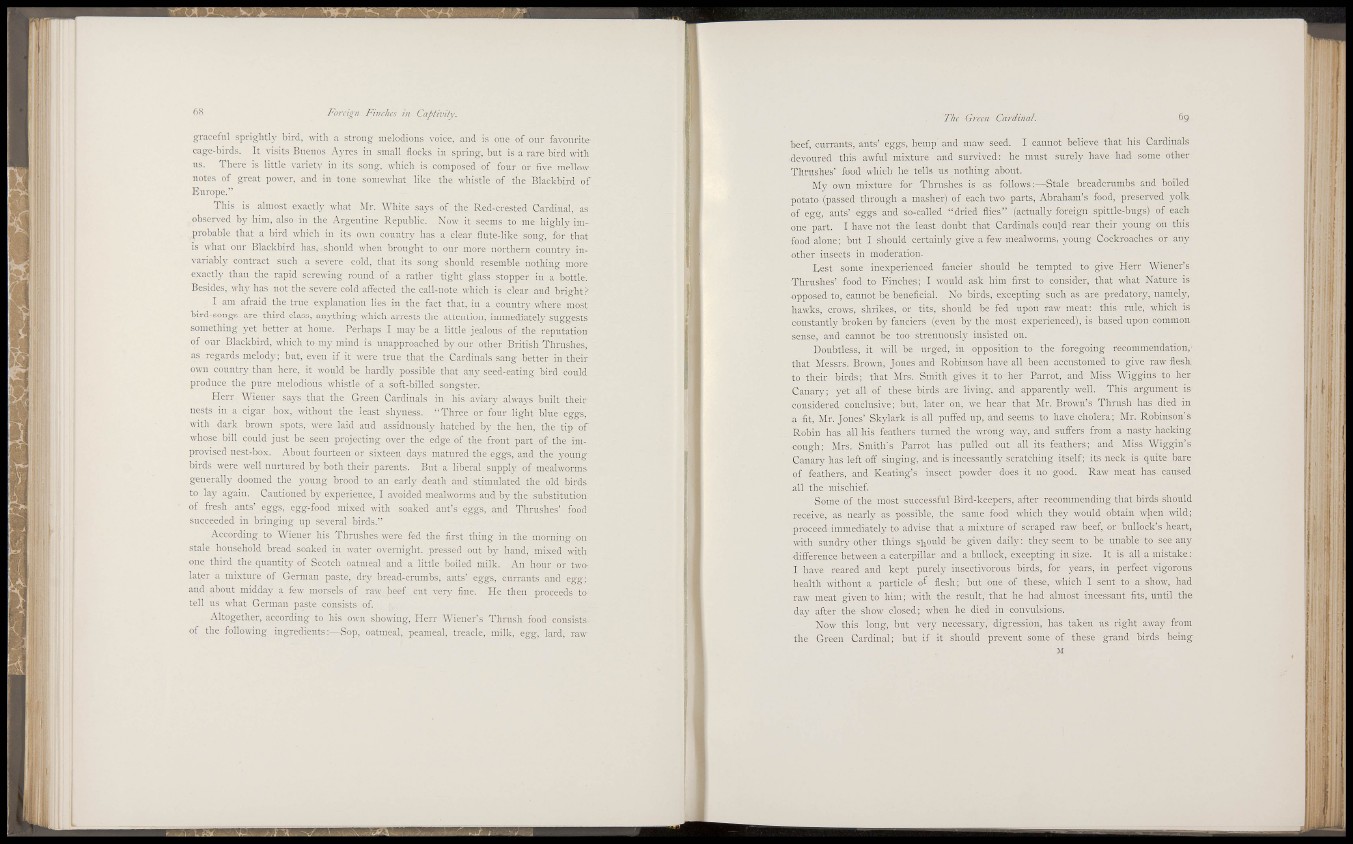
I
; ìisii
- i
mi
Miil
Foirigii /unc/u-s in CapHvity.
graceful sprightly bird, with a strong melodious voice, and is one of onr favourite
cage-birds. It visits Buenos Ayres in small flocks in spring, but is a rare bird with
us. There is little variety in its soug, vhich is composed of four or five mellow
notes of great power, and in tone somewhat like the whistle of the Blackbird of
Europe."
This is almost exactly- what Mr. White says of the Red-crested Cardinal, as
observed by him, also in the Argentine Republic. Now it seems to me highly improbable
that a bird which in its own country lias a clear flute-like song, for that
is what onr Blackbird has, shotild \\'hen brought to our more northern country invariably
contract such a severe cold, that its song should resemble nothing more
exactly than the rapid screwing round of a rather tight gla.ss stopper in a bottle.
Besides, why has not the severe cold affected the call-note which is clear and bright?
I am afraid the true explanation lies in the fact that, in a country where most
bird-songs are third class, anything which arrests the attention, immediately suggests
something yet better at home. Perhaps I may be a little jealous of the reputation
of our Blackbird, which to m^- mind is unapproached by our other British Thrushes,
as regards melody: but, even if it were true that the Cardinals sang better in their
own countr}' than here, it M-ould be hardly possible that au}- seed-eating bird could
produce the pure melodious whistle of a soft-billed songster.
Herr Wiener sa^-s that the Green Cardinals in his a\-iai-y alwa^-s built their
nests in a cigar box, without the least shyness. "Three or four light blue eggs,
with dark bro\\-n spots, were laid and assiduousl}- hatched b)- the hen, the tip of
whose bill could just be seen projecting over the edge of the front part of the improvised
nest-box. About fourteen or sixteen da^-s matured the eggs, and the young
birds w-ere well nurtured b}- both their parents. But a liberal suppl)' of mealworms
generally doomed the young brood to an earh' death and stimulated the old birds
to lay again. Cautioned by experience, I avoided meahvorms and by the substitution
of fresh ants' eggs, egg-food mixed with soaked ant's eggs, and Thrushes' food
succeeded in bringing up several birds."
According to Wiener his Thrushes were fed the first thing in the morning on
stale household bread soaked in water overnight, pressed out by hand, mixed with
one third the quantity of Scotch oatmeal and a little boiled milk. An hour or twolater
a mixture of Gennan paste, dry bread-crumbs, ants' eggs, currants and egg;
and about midday a few morsels of raw beef cut very fine. He then proceeds to
tell us \\-hat German paste consists of
Altogether, accoi'ding to his own showing, Herr Wiener's Thrush food consists
of the following ingredientsSop, oatmeal, peameal, treacle, milk, egg, lard, raw
The Green Cardinal. 69
beef, currants, ants' eggs, hemp and maw seed. I cannot believe that his Cardinals
devoured this awful mixture and survived: he must surely have had some other
Thrushes' food which he tells us nothing about.
My own mixture for Thrushes is as follows:—Stale breadcrumbs and boiled
potato (passed through a masher) of each two parts, Abraham's food, preserved yolk
of egg, ants' eggs and so-called "dried flies" (actually foreign spittle-bugs) of each
one part. I have not the least doubt that Cardinals could rear their young on this
food alone; but I should certainly give a few mealworms, young Cockroaches or any
other insects in moderation.
Lest some inexperienced fancier should be tempted to give Herr Wiener's
Thrushes' food to Finches; I would ask him first to consider, that what Natiire is
opposed to, cannot be beneficial. No birds, excepting such as are predatory, namely,
hawks, crows, shrikes, or tits, should be fed upon raw meat: this rule, which is
constantly broken by fanciers (even by the most experienced), is based upon common
sense, and cannot be too strenuously insisted on.
Doubtless, it will be urged, in opposition to the foregoing recommendation,
that Messrs. Brown, Jones and Robinson have all been accustomed to give raw flesh
to their birds; that Mrs. Smith gives it to her Parrot, and Miss Wiggins to her
Canary; yet all of these birds are living, and apparently well. This argument is
considered conclusive; but, later on, ^ve hear that Mr. Brown's Thrush has died in
a fit, Mr. Jones' Skylark is all puffed up, and seems to have cholera; Mr. Robinson's
Robin has all his feathers turned the wrong way, and suffers from a nasty hacking
cough; Mrs. Smith's Parrot has pulled out all its feathers; and Miss Wiggiu's
Canary has left off singing, and is ince.ssantly scratching itself; its neck is quite bare
of feathers, and Keating's insect powder does it no good. Raw meat has caused
all the mischief.
Some of the most successful Bird-keepers, after reconrmending that birds should
receive, as nearh* as possible, the same food which they would obtain when wild;
proceed immediately to advise that a mixture of scraped raw beef, or bullock's heart,
with sundry other things sl^ould be given daily: they seem to be unable to see any
difference between a caterpillar and a bullock, excepting in size. It is all a mistake:
I have reared and kept pureh" insectivorous birds, for years, in perfect ^-igorous
health without a particle of flesh; but one of these, which I sent to a show, had
raw meat given to him; with the result, that he had almost incessant fits, until the
day after the show closed; when he died in convulsions.
Now this long, but very necessary, digression, has taken us right away from
the Green Cardinal; but if it should prevent some of these grand birds being
' I
; i
y ,
f j
I